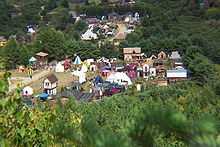Bicolline
|
Bicolline logo | |
| Location | Quebec |
|---|---|
| Founded | 1996 |
| Active? | Yes |
| Genre(s) | Fantasy |
| System | Proprietary (foam weapons) |
| Event style | Largest event is seven-day fest with around 2000 participants |
| Website |
www |

Bicolline is a fantasy live action role-playing game (LARP) campaign in Quebec. Events take place at a dedicated venue covering 140 hectares[1] called the Duchy of Bicolline located in Saint-Mathieu-du-Parc near Shawinigan.
Venue
The most passionate players involved over the years have built a medieval village with roads, bridges, ditches, an inn and a castle at the Duchy of Bicolline venue.[1] Construction days are scheduled throughout spring and summer. Players are responsible for their buildings and must follow standards of construction. The village is composed of one hundred buildings, with more being added. The demand for construction sites is such that one Bicolline staff member spends all year controlling applications, validating the plans for buildings, ensuring that projects are feasible, and so on.
Setting
The world of Bicolline has its own geography, economy, conflicts, and complex geopolitics that have been evolving since its inception in response to the actions of the players. The geopolitical system is based on feudal Europe, and is the basis for most of the actions undertaken on the ground during the events.
The complexity of the setting is such that it is almost impossible for an individual to control more than one area of competition such as commercial, political, military, or religious. Generally, guilds specialize and focus on one or two aspects of the game. The guilds have diverse experts among their members, each able to follow the changes and fully understand one aspect of the world of Bicolline.
The political arena consists of fiefdoms, provinces that form the kingdom. All levels of politics can be filled by players, making the world very dynamic. Accession to titles of nobility follows a democratic system. This modern aspect helps to make the experience accessible to all. It is possible to create internal conflicts and external playing with virtual units. These virtual wars can be realized in a fight during real scenarios on the ground.
The commercial aspect of the game is constantly changing, following an in-game market. Goods are transacted at extremely variable prices depending on their availability and the stability of the kingdom. Bicolline mints its own coins, called the Solar, that are the currency of transaction.
Guilds
The basic unit of organisation both in-game and out-of-game is the guild. Guilds are voluntary groupings of players promoting an event, a race or a common goal. Typically a guild has about thirty members. There are sometimes unguilded clans with fewer members which will usually eventually form a registered guild. The guild structure allows efficient distribution of information and gives players a weight in the game beyond what they can achieve as individual characters. There are currently 60 recorded guilds and clans.
The majority of the guild can be divided into broad categories: military, commercial, political, religious, criminal, and magical. Each is affiliated with one or more kingdoms in the world of Bicolline: Empire, Andorra, Arganne, Ozame, Nasgaroth, Garganesh, Irendill, Taluskan, Sands-City, Berkwald, and the Independent Cities.
System
Unlike some LARPs, Bicolline does not have a character creation system. The players can portray any kind of character that they are able to dress as. Characters can become runic warriors or clerics during the week of Bicolline, and can apprentice under master alchemists and sorcerers to give their guild bonuses between events. Much of the roleplaying in the game of Bicolline happens in the "virtual world" between events, where armies move, economies produce income, and sorcerers cast spells.
Activities


As many as 2000 players each year attend the main event The Great Battle of Bicolline.[1] Dozens of volunteers and a core group of employees work all year to create one of the world's largest and most decorum-rich LARP settings. In addition to the Great Battle various events are held throughout the year including the Feast of Gallion (approximately 600 people in March), tavern evenings (100 people about 7-8 times per year) and campaigns and battle scenarios of all kinds that usually attract several hundred people.
The Great Battle of Bicolline
Every year since 1996 a large LARP has been organised at the venue. The Great Battle of Bicolline brings together around 2000 LARPers and medieval reenactors over seven days, and culminates in a huge battle.[2] The battle is prepared for throughout the year with skirmishes and diplomacy between the various groups that attend.
Trollball
Trollball is a sport played in Bicolline and other LARP settings. It is played in Europe and Canada, with many teams competing. Trollball was started by Jose Antonio Ouellette in 1995. [3]
The goal of the game is to put the troll head in a well without being hit by the foam weapons of the opposing team's attackers. Each player has a clearly defined position within their team such as Troller, Healer, Attacker or Reserve. Strategy, group cohesiveness and solid fighting skills are major assets in this sport.
Tournaments
A variety of tournaments are held during the week of Bicolline. These range from chess (with an expensive entry fee) to gladiators (where pairs of armorless fighters face off), strongman (speed and strength), and archery (including a one-on-one combat).
Quests
Many guilds organize weeklong quests for other players. There is usually some reward for being the first to complete the quest.
References
- ↑ 1.0 1.1 1.2 Hocini, Idir (2007-09-29). "Aventure à Bicolline" (HTML). Le rallye Québec-France (in French) (Müvmédia). Archived from the original on 2007-10-30. Retrieved 2007-11-26.
- ↑ Moisan, Evelyne (2006-08-18). "Oyez! Oyez! Chevaliers, elfes et sorciers sont arrivés!" (HTML) (in French). Le Nouvelliste. Retrieved 2007-11-26.
- ↑ Bottenburg, Rupert (1998-08-20). "Days of Lore" (HTML). Montreal Mirror. Retrieved 2007-11-26.